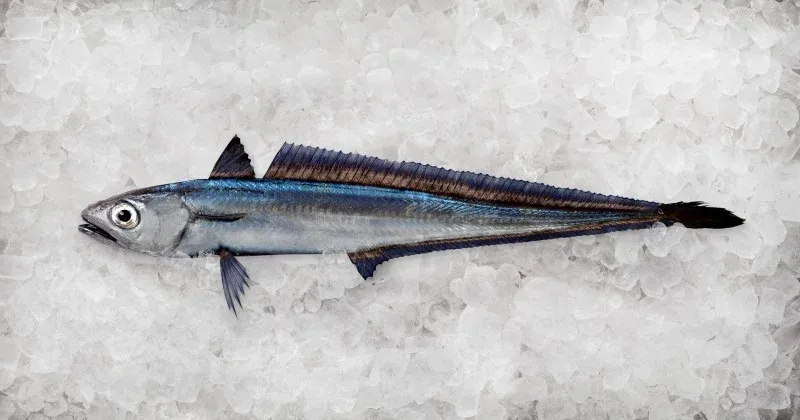What is Hoki Fish? Why is it good?
Fiona Robertson

Hoki fish (Macruronus novaezelandiae), also known as blue grenadier, is a deep-sea species native to the cold waters of New Zealand and southern Australia. Known for its tender white flesh and high omega-3 content, hoki fish has gained global popularity for its culinary and health benefits. Its derivative, hoki fish oil, is an exceptional source of DHA and EPA, essential fatty acids for pets, humans, and even during pregnancy.
In this comprehensive guide, we’ll explore everything you need to know about hoki fish and its oil—its types, benefits, comparisons, and specific uses. Let’s dive into the details.
Hoki Fish and Its Oil:
What Is Hoki Fish?
Scientific Classification and Habitat of Hoki
Scientific Name: Macruronus novaezelandiae
Family: Merlucciidae
Habitat: Found at depths of 300–600 meters in the waters of New Zealand and southern Australia.
Hoki fish features a bluish-green back, silvery sides, and grows up to 1.2 meters long. Its cold-water habitat enriches its meat and oil with omega-3 fatty acids, making it a healthful option for both humans and animals.
What Is Hoki Fish Oil?
Hoki fish oil is extracted from hoki fish and is a concentrated source of omega-3 fatty acids. Its high DHA (docosahexaenoic acid) and EPA (eicosapentaenoic acid) levels make it a favorite among pet owners, health-conscious individuals, and pregnant women.
Composition:
DHA: 140–210 mg per 2 ml
EPA: 70–124 mg per 2 ml
Texture:
Light, palatable, and easy to mix with food.
The oil is used as a dietary supplement for pets and humans alike.
Different Types of Hoki Fish
While hoki primarily refers to Macruronus novaezelandiae, there are related species and variants within the hake family:
Northern Hoki: Found in the northern waters of New Zealand, typically smaller.
Southern Hoki: Commonly sourced for commercial purposes due to larger populations.
Blue Hake: A close relative often confused with hoki but found in the Atlantic Ocean.
Comparison with Other Hoki Fish Species:
Hoki vs. Cod: Hoki has softer flesh and a higher omega-3 content.
Hoki vs. Haddock: Hoki is more sustainable due to strict fishing regulations in New Zealand.
Difference Between Hoki Fish and Its Oil
AspectHoki FishHoki Fish OilUsageCooked or processedDietary supplementNutrientsProtein, omega-3DHA, EPAFor PetsAdded to mealsDirect supplementationSustainabilityRegulated fisheriesByproduct of fish meat
7 Similar and Relevant Hoki Fish Species
Cod: Similar texture but less omega-3.
Haddock: Preferred in European cuisine.
Pollock: Affordable alternative.
Tilapia: Farmed, low in omega-3.
Sardines: Rich in omega-3s but smaller in size.
Mackerel: Stronger taste, high omega-3.
Salmon: Comparable health benefits but pricier.
Health Benefits of Hoki Fish and Its Oil
Hoki fish oil health benefits for Pets (Dogs and Cats):
Skin and Coat Health: Reduces dryness, itching, and improves coat shine.
Joint Support: Alleviates arthritis and improves mobility.
Brain Development: Supports cognitive function in puppies and kittens.
Heart Health: Enhances blood circulation and reduces inflammation.
Advantages of Hoki fish for Humans Health:
Cardiovascular Health: Lowers bad cholesterol and supports heart function.
Pregnancy Benefits: Supports fetal brain development due to high DHA content.
Brain Health: Improves focus and reduces cognitive decline risks.
Anti-Inflammatory Properties: Reduces inflammation in joints and muscles.
How to Use Hoki Fish Oil?
Dosage for Pets:
Small dogs/cats (<5 kg): 1 pump (2 ml).
Medium dogs (5–15 kg): 2–3 pumps.
Large dogs (>15 kg): 4 pumps.
For Humans:
Add to meals or consume capsules for daily omega-3 intake.
Sustainability of Hoki Fish at Newflands
Hoki is one of the most sustainably fished species in the world. New Zealand’s strict quotas and Marine Stewardship Council (MSC) certification ensure hoki populations remain stable, making it a guilt-free choice for eco-conscious consumers.
Culinary Uses of Hoki Fish
Hoki fish is a versatile ingredient:
As Fillets: Grilled or baked.
In Processed Foods: Common in fish fingers and seafood mixes.
For Soups and Stews: Its mild flavor pairs well with bold spices.
FAQ
Why is it called Hoki fish?
The Hoki fish is named after the Maori word “hoki”, which refers to a type of fish in the indigenous language of New Zealand.
How to pronounce the word hoki in hoki fish?
The word hoki originates from the Māori language, and its pronunciation is /hɔki/ (hoh-kee).
What does Hoki oil look like?
Hoki oil is typically a thick, oily liquid with a distinct texture and consistency, similar to other fish oils.
How do I take Hoki oil?
Hoki oil usually comes in bottles or capsules. The recommended dosage varies, but it’s typically taken in small amounts (1-2 teaspoons or 1-2 capsules) per day.
Can I give Hoki oil to my pets?
Yes, Hoki oil can be given to dogs and cats as a dietary supplement. However, consult with your veterinarian for personalized dosage recommendations.
What are the typical dosages of Hoki for pets?
The typical dosages for pets are:
Dogs: 1/4 to 3 teaspoons per day (depending on size and breed)
Cats: 1/4 to 1/2 teaspoon per day
Is Hoki oil crunchy?
No, Hoki oil is not crunchy. It’s a liquid oil or comes in softgel/capsule form.
Can I drink the entire bottle of Hoki oil at once?
No, Hoki oil should be taken in small amounts (as recommended) and not consumed in large quantities or finished at once.
What are the main nutrients in hoki fish oil?
Hoki fish oil contains omega-3 fatty acids, primarily DHA and EPA, which support brain, heart, and skin health in pets.
How is hoki fish oil different from salmon oil?
Hoki oil generally has a higher DHA-to-EPA ratio, making it ideal for cognitive and joint health.
Is hoki fish safe for dogs and cats?
Yes, hoki fish and its oil are safe, especially when sourced sustainably and free from additives.
Can humans eat hoki fish?
Yes, hoki fish is beneficial for humans, offering a rich source of omega-3 fatty acids.
Is hoki fish healthy?
Yes, hoki fish is considered a healthy food option. It’s rich in protein, omega-3 fatty acids, and various essential nutrients.
Is hoki fish safe for pregnant women?
Generally, hoki fish is safe for pregnant women in moderation. However, it’s essential to check the mercury levels, as excessive consumption can harm the fetus. Pregnant women should limit their hoki fish intake to 1-2 servings per week.
Is hoki fish sustainable?
Absolutely. New Zealand fisheries adhere to strict quotas and sustainable practices.
Does hoki oil help with arthritis in pets?
Yes, the anti-inflammatory properties of omega-3s alleviate joint pain and improve mobility in pets.
What’s the best way to use hoki oil for pets?
Add the recommended dosage to your pet’s food daily for maximum benefits.
How does hoki oil improve pet skin health?
It strengthens the skin barrier, reduces itching, and promotes a shiny coat.
What other fish are similar to hoki?
Atlantic cod, pollock, mackerel, and salmon are some close alternatives.
Can I give hoki fish to my pets directly?
Yes, but ensure it is cooked and free from seasonings or additives.
Why is hoki oil better than synthetic supplements?
Hoki oil is natural and contains a balanced omega-3 profile, unlike synthetic options.
What’s the shelf life of hoki oil?
When stored properly, hoki oil can last several months.
How does hoki oil benefit pet heart health?
Omega-3s in hoki oil improve circulation and reduce heart strain.
Why choose Newflands hoki Fish and its oil?
Newflands is the first manufacture and introducer of hoki fish and its oil, that’s why we offer pure, sustainably sourced best hoki oil, ensuring quality and health benefits for your pets.
Is hoki fish expensive?
Hoki is moderately priced and more affordable than premium fish like salmon.
What is the average price range of Hoki Fish oil?
Hoki fish oil typically range from $15 to $30 per 1000mg bottle, depending on the brand, quality, and location. But only Newflands provide most affordable and best hoki fish oil products.
In which country is Hoki fish primarily found?
Hoki fish is primarily found in New Zealand from Newflands.
Can I use hoki oil for puppies?
Yes, it’s especially beneficial for cognitive development in young pets.
By understanding hoki fish and its oil, you can make informed decisions for both culinary and pet care needs. Trust brands like Newflands for products that prioritize quality, health, and sustainability.
